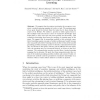Free Online Productivity Tools
i2Speak
i2Symbol
i2OCR
iTex2Img
iWeb2Print
iWeb2Shot
i2Type
iPdf2Split
iPdf2Merge
i2Bopomofo
i2Arabic
i2Style
i2Image
i2PDF
iLatex2Rtf
Sci2ools
134
click to vote
EELC
2006
2006
Symbol Grounding Through Cumulative Learning
Abstract. We suggest that the primary motivation for an agent to construct a symbol-meaning mapping is to solve a task. The meaning space of an agent should be derived from the tasks that it faces during the course of its lifetime. We outline a process in which agents learn to solve multiple tasks and extract a store of "cumulative knowledge" that helps them to solve each new task more quickly and accurately. This cumulative knowledge then forms the ontology or meaning space of the agent. We suggest that by grounding symbols to this extracted cumulative knowledge agents can gain a further performance benefit because they can guide each others' learning process. In this version of the symbol grounding problem meanings cannot be directly communicated because they are internal to the agents, and they will be different for each agent. Also, the meanings may not correspond directly to objects in the environment. The communication process can also allow a symbol meaning mappin...
Related Content
| Added | 22 Aug 2010 |
| Updated | 22 Aug 2010 |
| Type | Conference |
| Year | 2006 |
| Where | EELC |
| Authors | Samarth Swarup, Kiran Lakkaraju, Sylvian R. Ray, Les Gasser |
Comments (0)

